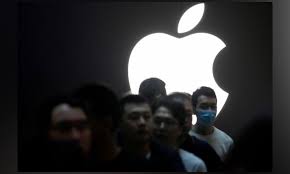As Beijing tightens oversight, Apple enforces a new check on apps in China
HONG KONG: Apple has joined local competitors that had implemented the strategy years earlier to comply with tighter state rules by starting to demand new applications to show confirmation of a Chinese government licence before their publication on its China App Store.
According to information on Apple’s website for developers, the company started forcing app developers last Friday to submit the “internet content provider (ICP) filing” whenever they publish new applications on the App Store.
The majority of regional app shops, including those run by Tencent and Huawei, have embraced the long-established registration mechanism known as an ICP file since at least 2017.
The need that developers establish a firm in China or collaborate with a local publisher in order to get an ICP filing licence has been a barrier for many overseas applications.
Due to its lax ICP policy, Apple has been able to sell significantly more mobile applications than its regional competitors, which has increased the American tech giant’s appeal in China, its third-largest market after the Americas and Europe.
Apple made its decision after China further tightened its regulation of mobile applications in August by issuing a new rule requiring all app shops and app developers to file a “app filing” with the authorities that includes information about their businesses.
The first round of mobile app shops with finished software submissions was named by Chinese authorities last week, but Apple’s App Store was not on the list.
A request for comment from Apple was ignored.
The accessibility of hundreds of thousands of applications on Apple’s App Store in China, including well-known international apps like X, previously known as Twitter, and Telegram, which gained popularity during demonstrations over COVID-19 lockdowns last year, may depend on Apple’s compliance status.
As Beijing places a greater emphasis on security, Apple is also having issues in China, as seen by certain government organizations forbidding staff from using iPhones, according to a story from Reuters last month.
Demanding ICP files from developers, according to Rich Bishop, CEO of app publishing company AppInChina, gets Apple one step closer to becoming completely compliant in China.
The August enlarged regulation basically mandates that an app’s backend be housed in China, and as of last month, this requirement has become a requirement for applications to be shown in regional Android app stores.
Many developers have expressed their worries about Apple’s move on social media, worried that the company may impose more stricter constraints in order to completely adhere to Chinese legislation.
An independent developer named Jinyu Meng said on X, “If my apps can’t be launched in China without app filing, I will take down my apps [there].”
Some iPhone users in China wrote on the social media platform X that they may have to start using Apple IDs from other nations in order to access their preferred applications.
applications that do not have the required files will be penalized under the new regulation after the grace period, which will expire in March of the following year, while newly built applications must comply with the law starting in September.







